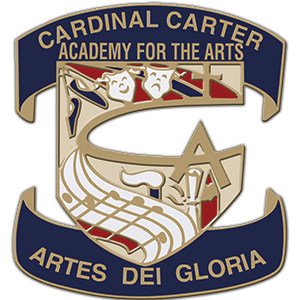
Courses
Religion
At Cardinal Carter Academy for the Arts, we offer a comprehensive religious education program which is designed to help our students in their personal faith development and to assist in their formation as discerning believers shaped in the Catholic faith tradition.
Religious education programs are designed to invite the student into a personal relationship with Jesus Christ, the foundation and cornerstone (Ephesians 2:20), of the Catholic faith. Program content and learning objectives are shaped by this goal through the study of sacred scripture, Church teachings and its moral foundations for Christian living, and participation in and study of the sacramental and liturgical life of the Church.
It is the hope of Catholic education that the growth of understanding and awareness of faith issues will deepen the personal experience and the spiritual growth of each individual so that they all may be appropriated to the lived experience.
A portion of the Religion curriculum is delivered through each art area.
Religious Education Requirement
Catholic faith formation is an important focus in Catholic Secondary Schools. Each student is required to take a full credit course in Religious Education each year. These courses are offered at the Open level in Grades nine and ten and at the University/ College and Open levels in grades eleven and twelve.
The Ministry of Education recognizes all Religious Education courses as credits which can be used to fulfill diploma requirements. All University/College courses in Religious Education are recognized by post-secondary institutions for admission purposes.
Ontario Catholic Graduate Expectations
Diploma and Religious Education requirements enable Catholic Schools to fulfill the following Catholic Graduate Expectations. It is our vision that each student graduating from a Catholic School system is expected to be:
A discerning believer formed in the Catholic Faith community who celebrates the signs and sacred mystery of God’s presence through word, sacrament, prayer, forgiveness, reflection and moral living.
An effective communicator who speaks, writes and listens honestly and sensitively, responding critically in light of gospel values.
A reflective, creative and holistic thinker who solves problems and makes responsible decisions with an informed moral conscience for the common good.
A self-directed, responsible, lifelong learner who develops and demonstrates his/her God-given potential.
A collaborative contributor who finds meaning, dignity and vocation in work which respects the rights of all and contributes to the common good.
A caring family member who attends to family, school, parish, and the wider community.
A responsible citizen who gives witness to Catholic social teaching by promoting peace, justice and the sacredness of human life.
